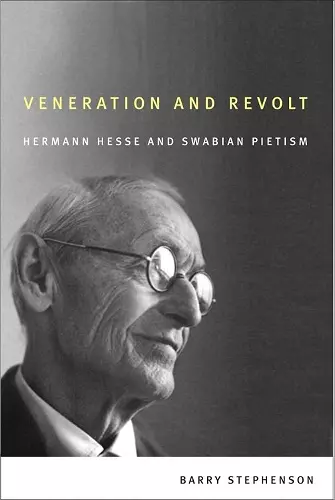Veneration and Revolt
Hermann Hesse and Swabian Pietism
Format:Hardback
Publisher:Wilfrid Laurier University Press
Published:28th Feb '09
Should be back in stock very soon

One of the most widely read German authors in the world, Hermann Hesse (1877-1962) won the Nobel Prize for Literature in 1946. After his death, his novels enjoyed a revival of popularity, becoming a staple of popular religion and spirituality in Europe and North America.
Veneration and Revolt: Hermann Hesse and Swabian Pietism is the first comprehensive study of the impact of German Pietism (the religion of Hesse's family and native Swabia) on Hesse's life and literature. Hesse's literature bears witness to a lifelong conversation with his religious heritage despite that in adolescence he rejected his family's expectation that he become a theologian, cleric, and missionary.
Hesse's Pietist upbringing and broader Swabian heritage contributed to his moral and political views, his pacifism and internationalism, the confessional and autobiographical style of his literature, his romantic mysticism, his suspicion of bourgeois culture, his ecumenical outlook, and, in an era scarred by two world wars, his hopes for the future. Veneration and Revolt offers a unique perspective on the life and works of one of the twentieth century's most influential writers.
"The enormous commentary on Hesse rarely takes this Pietist context seriously, but according to Stephenson, it is impossible to understand Hesse without understanding Pietism.... Stephenson's argument is compelling and its implications are striking.... Clearly and engagingly written, thoroughly rooted in Hesse's work and the vast commentary on Hesse, Stephenson's book is a fine general introduction to Hesse, as well as a powerful argument about the roots of Hesse's art. An important contribution to Hesse studies, Veneration and Revolt also contributes significantly to the ongoing debate about the origins, meanings, and trajectories of modernity." -- Robert Weldon Whalen, Queens University of Charlotte -- German Studies Review, 34/3, 2011, 201111
"Taking his title from Hesse, Barry Stephenson has given us the first thorough appreciation of the Nobel Prize--winner within the religious culture from which he emerged. Hesse's debt to pietism, against which he rebelled yet which he always venerated as his spiritual heritage, was long a commonplace. But no previous scholar approached the problematic topic with the requisite background in religious studies that informs this book. Beginning with the history of Pietism and its role in Swabia and German Romanticism, it moves through Hesse's life and oeuvre, exposing significant new dimensions from his early 'religion of art' to The Glass Bead Game. This major and highly readable contribution forces us to contemplate Hesse's novels in a wholly original and edifying light." -- Theodore Ziolkowski, Princeton University, author of Modes of Faith (2007), and Minos and the Moderns (2008) -- 200901
ISBN: 9781554581498
Dimensions: 235mm x 158mm x 18mm
Weight: 600g
300 pages